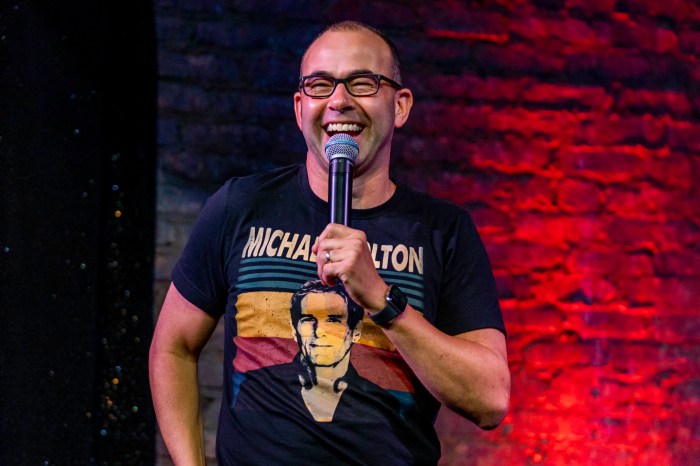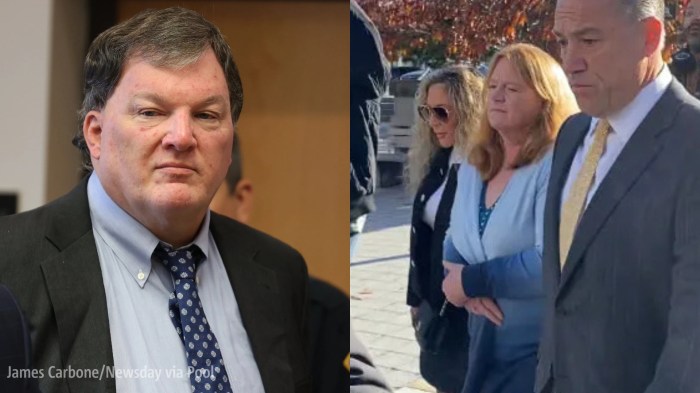Parents and supporters of a group called Citizens for 5G Awareness picketed Wednesday outside a Verizon store in East Northport to protest the increase in small cell wireless antennas in their neighborhoods.
Debbie Persampire, 46, of Huntington, started the organization about two years ago when a small cell antenna was put up five feet outside her backyard fence. When she researched the technology, what worried her most was the unknown impact she felt it would have on her children — but the cell phone industry maintains that the devices are safe.
“I worry every single day,” said Persampire, a former teacher in Commack. “Every time I put my children to sleep in their beds and kiss them goodnight, I worry. I wonder what’s going to happen to them after this long term exposure that they’re being forced to deal with.”
The local rally was just one of many in a nationwide day of protests calling on wireless companies to stop deploying small cell wireless microwave antennas in residential areas “until their technology can be proven safe.”
The Cellular Telecommunications Industry Association (CTIA), which represents the U.S. wireless communications industry, says the technology is safe.
“The science shows that the organizer’s claims about the health effects of radiofrequency energy are false,” the group said in a statement in response to the rally. “Radiofrequency energy from wireless devices and networks, including 5G, has not been shown to cause health problems, according to the consensus of the international scientific community.”
According to Verizon, small cells are mounted discreetly on street lights, utility poles, buildings and other structures, delivering the media and information that users need.
“Verizon has been investing heavily in small cells over the last several years to stay ahead of growing demand on our 4G LTE network, but this technology is also integral to laying the groundwork for our upcoming 5G network,” wrote Verizon spokesman John O’Malley.
Citizens for 5G Awareness remain unconvinced. Some of the organizers of the event cited a U.S. National Toxicology Program (NTP) report According to an article from Environmental Health Trust,in which scientists concluded there is “clear evidence” linking cell phone radiation to the development of cancers in rats.
The protesters wish others would take it more seriously.
“This was a 10-year, $30 million study done by our government,” said Persampire. “We do have some very good science showing that this is not safe and that we need to take the precautionary principle with our children.”
Persampire was not alone in worrying about the effect on children. Many other parents stood beside her with children’s health at the forefront of their minds.
Pam Fischetti, a 37-year-old stay-at-home mom from Centerport, attended the rally with two young kids holding both of her hands. After hearing about a proposed cell tower in her town, she decided to show her support for the group.
“I’m definitely concerned for my children’s health and safety,” said Fischetti.
Patti Wood, the executive director of the nonprofit Grassroots Environmental Education, which works to educate the public on the links between common environmental exposures and health, also attended the rally.
“If you’re not a techie type and you’re just a normal American family raising young children in a neighborhood, you don’t want to be exposed 24/7,” said Wood. “[Carriers] are saying, ‘Too bad, we’re going to expose you, your family and your kids whether you like it or not.’”
According to the Federal Communication Commission (FCC), “Radiofrequency emissions from antennas used for cellular … transmissions result in exposure levels on the ground that are typically thousands of times below safety limits.”
The FCC says that these safety limits were adopted based on the recommendations of expert organizations and endorsed by federal government agencies responsible for health and safety. Therefore, the FFC says, there is no reason to believe that such devices could constitute a potential health hazard to nearby residents.
Anne Mayer, another organizer of the group, is a former safety certification engineer on industrial and commercial equipment at Underwriters Laboratories for 21 years. She says that we don’t need 5G.
“[The companies] make it sound like you can’t have your cell phones without it,” said Mayer. “Yeah, you won’t be able to download a Netflix movie in two seconds. We don’t need to put our whole planet, privacies, and protections at risk so that we can download movies from Netflix in two seconds.”
































